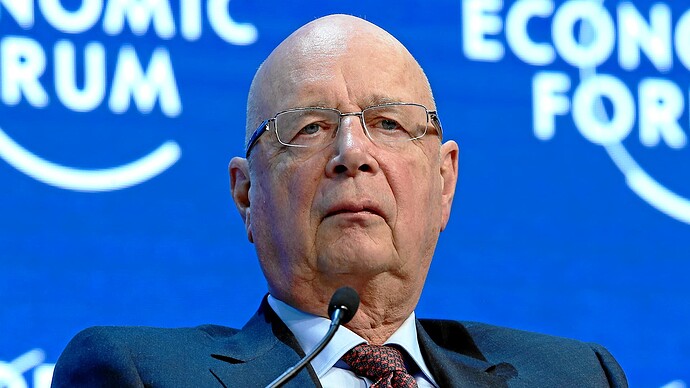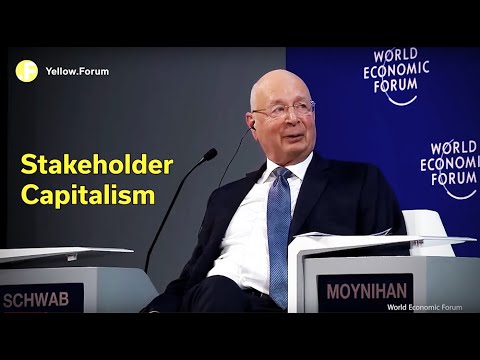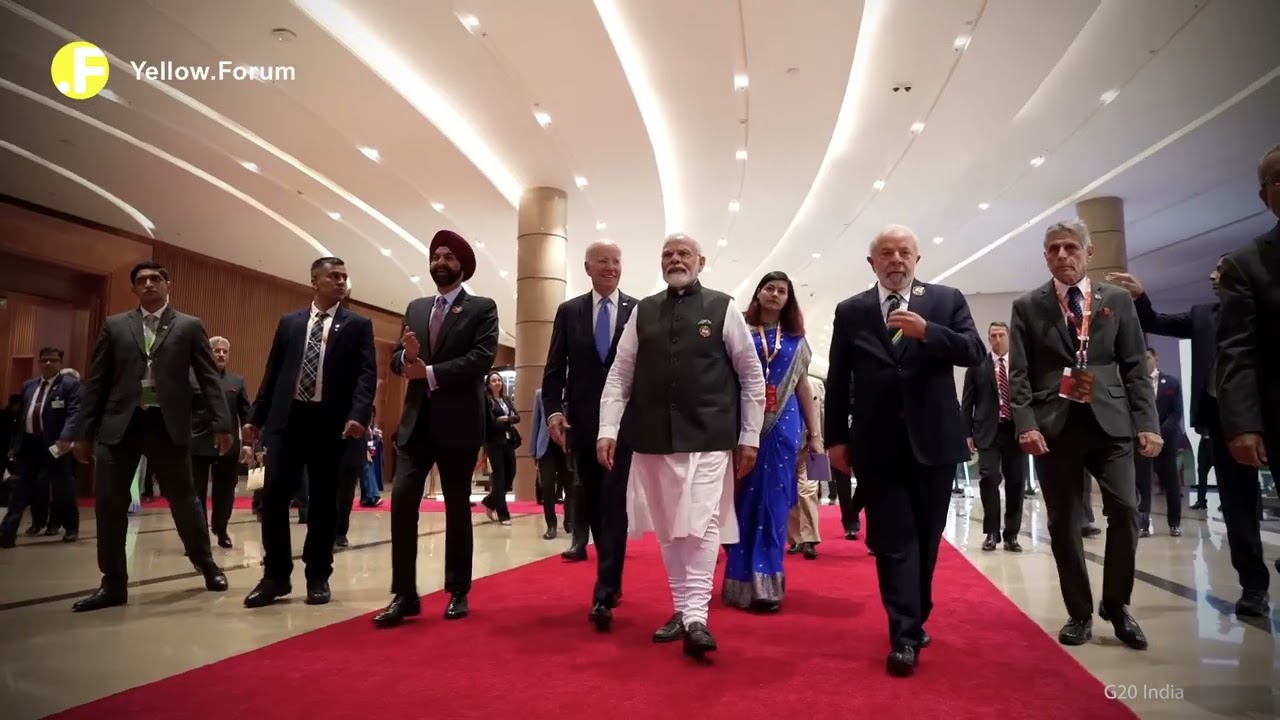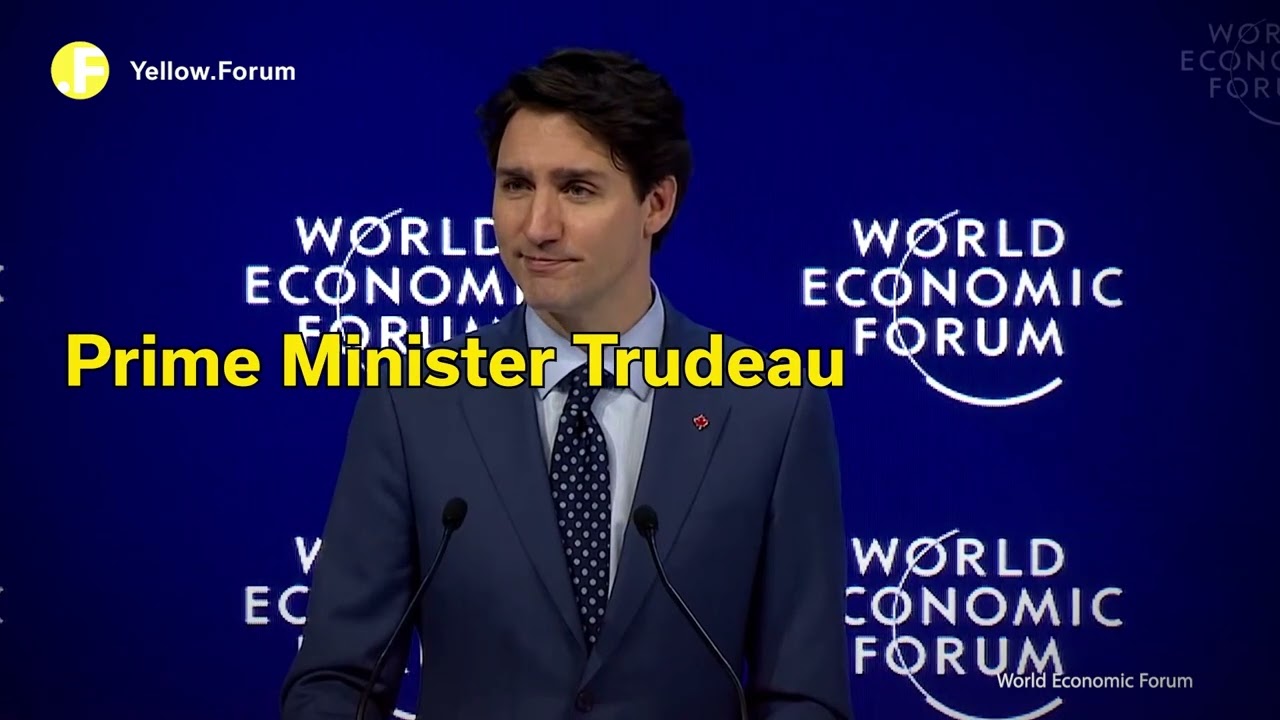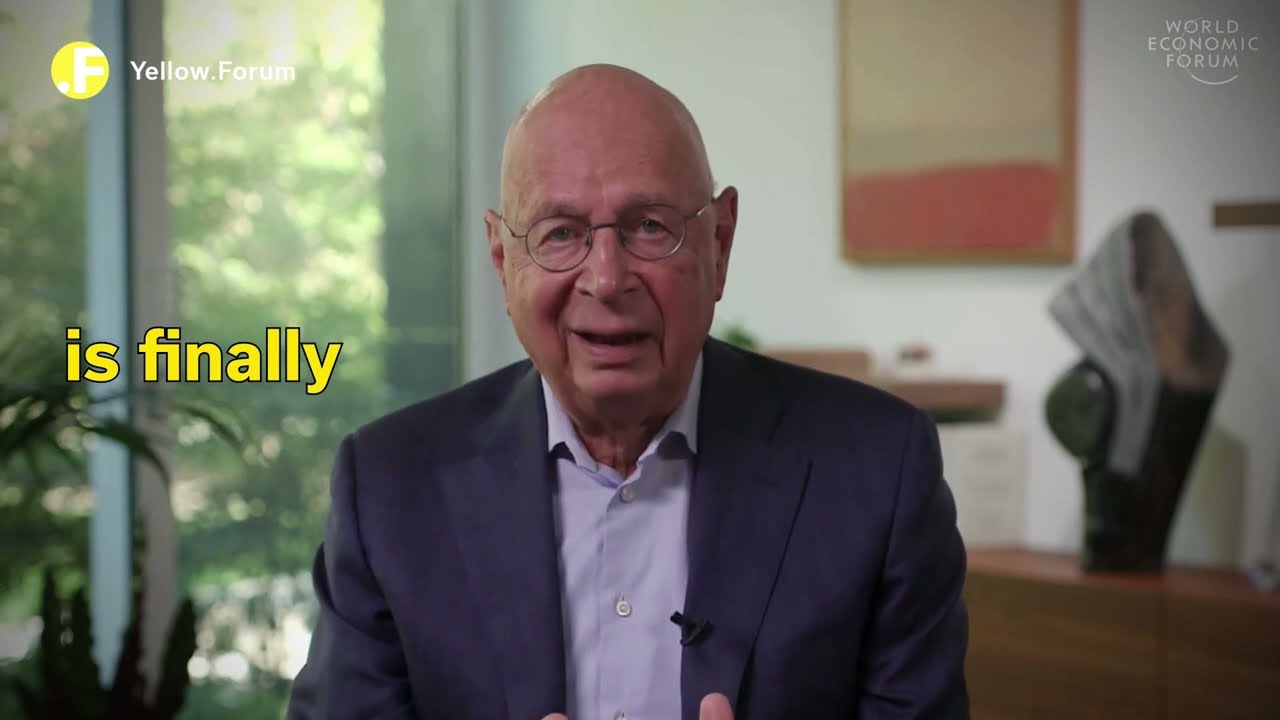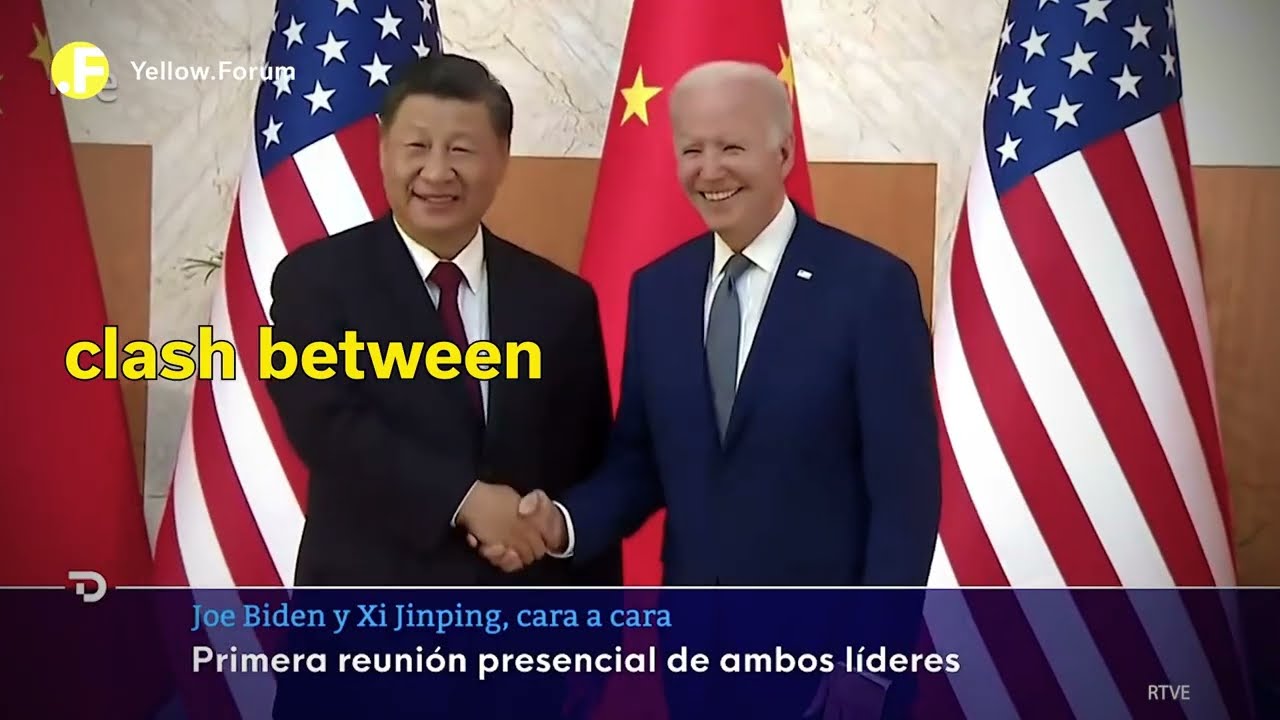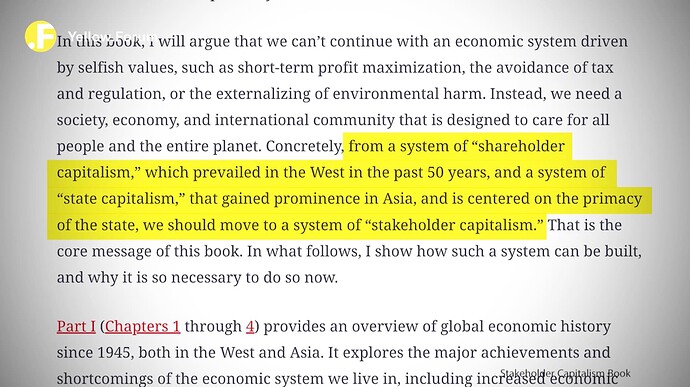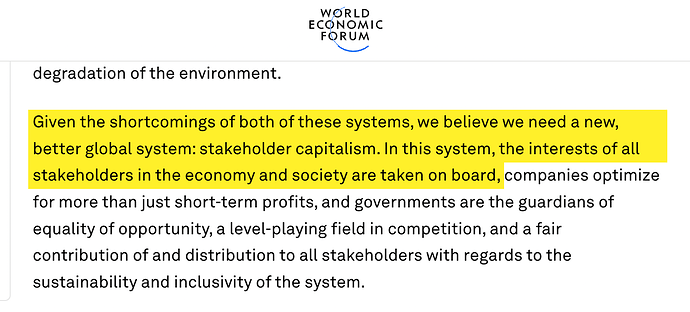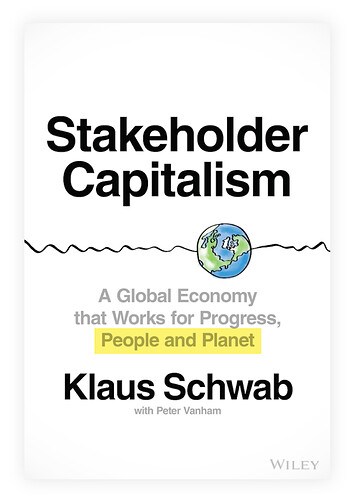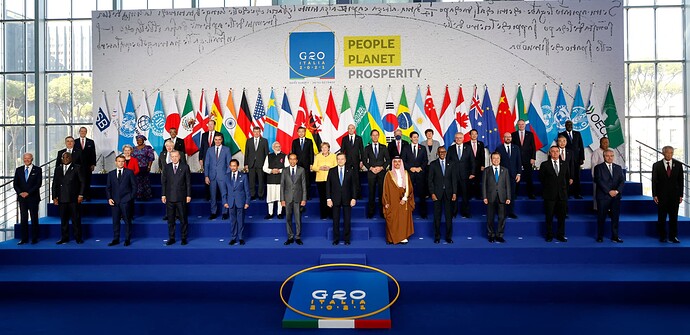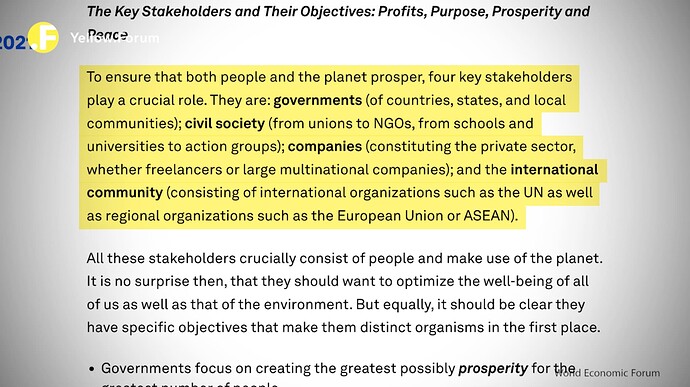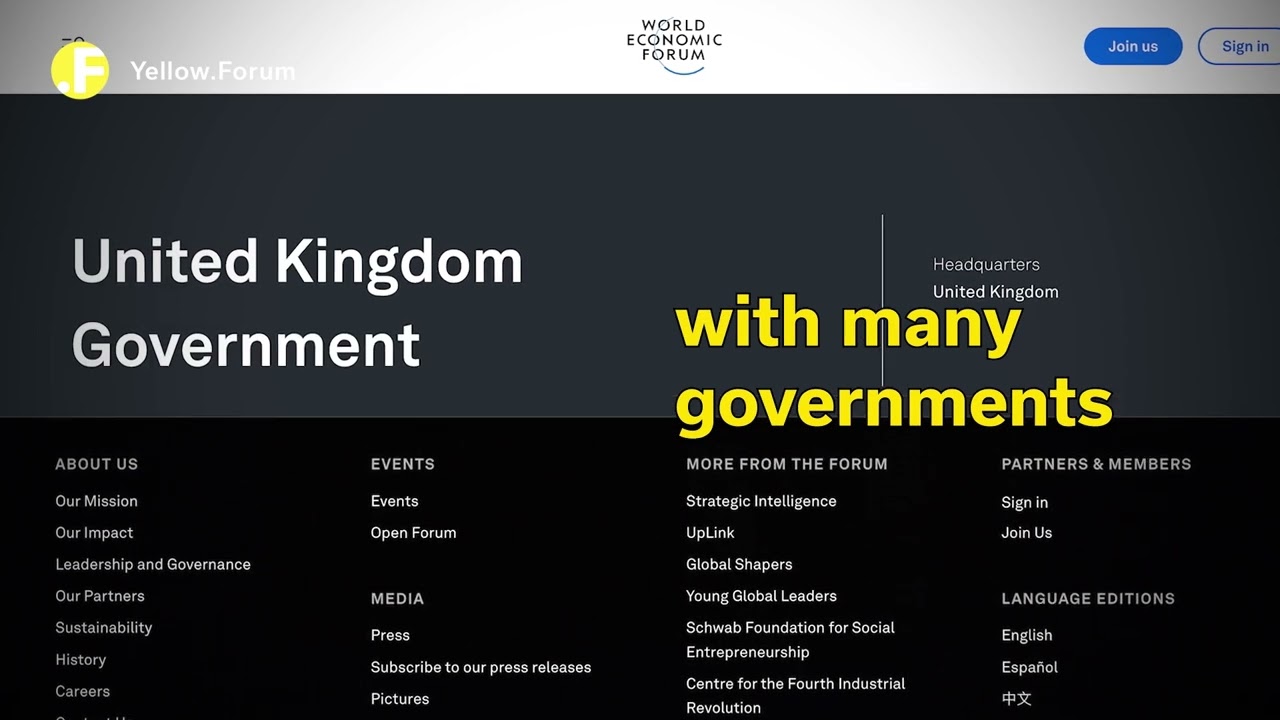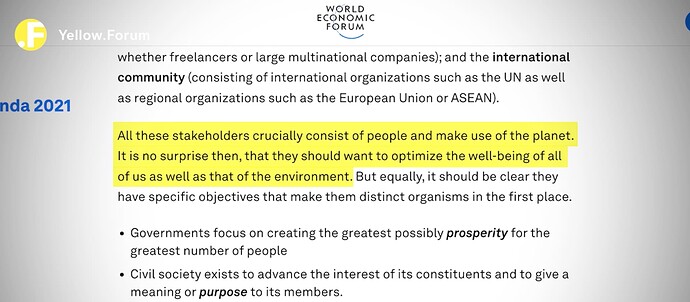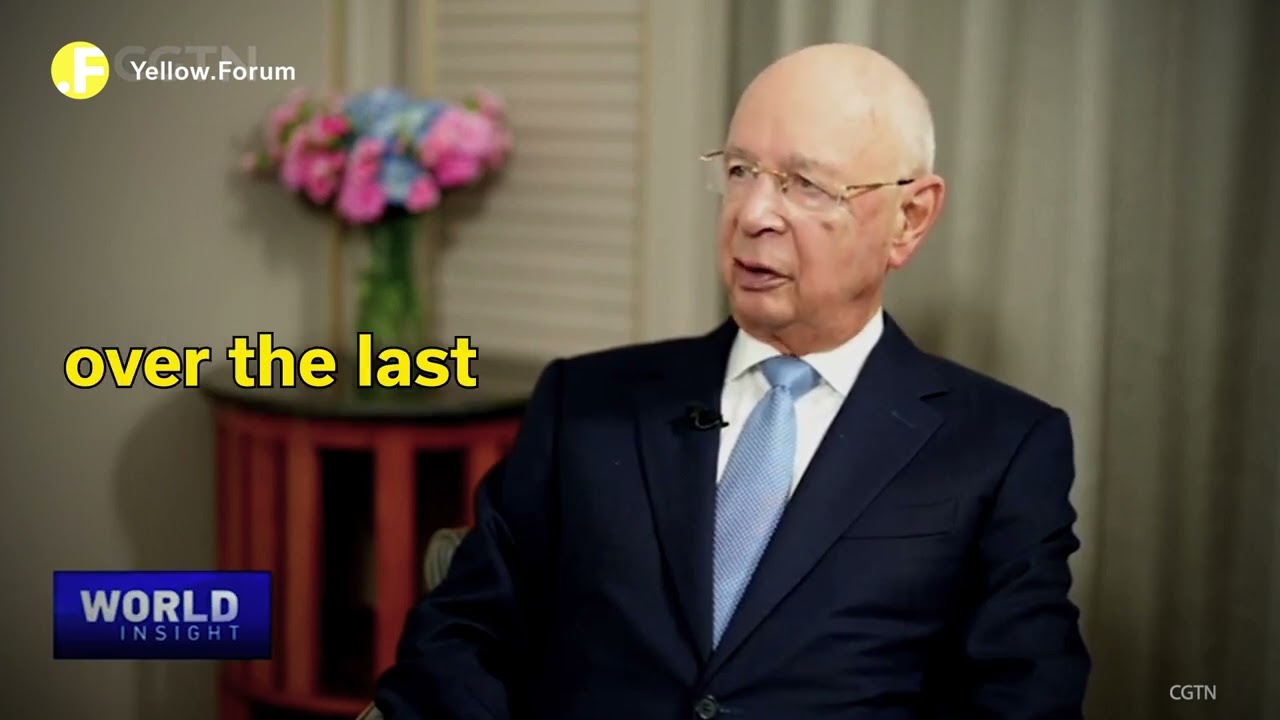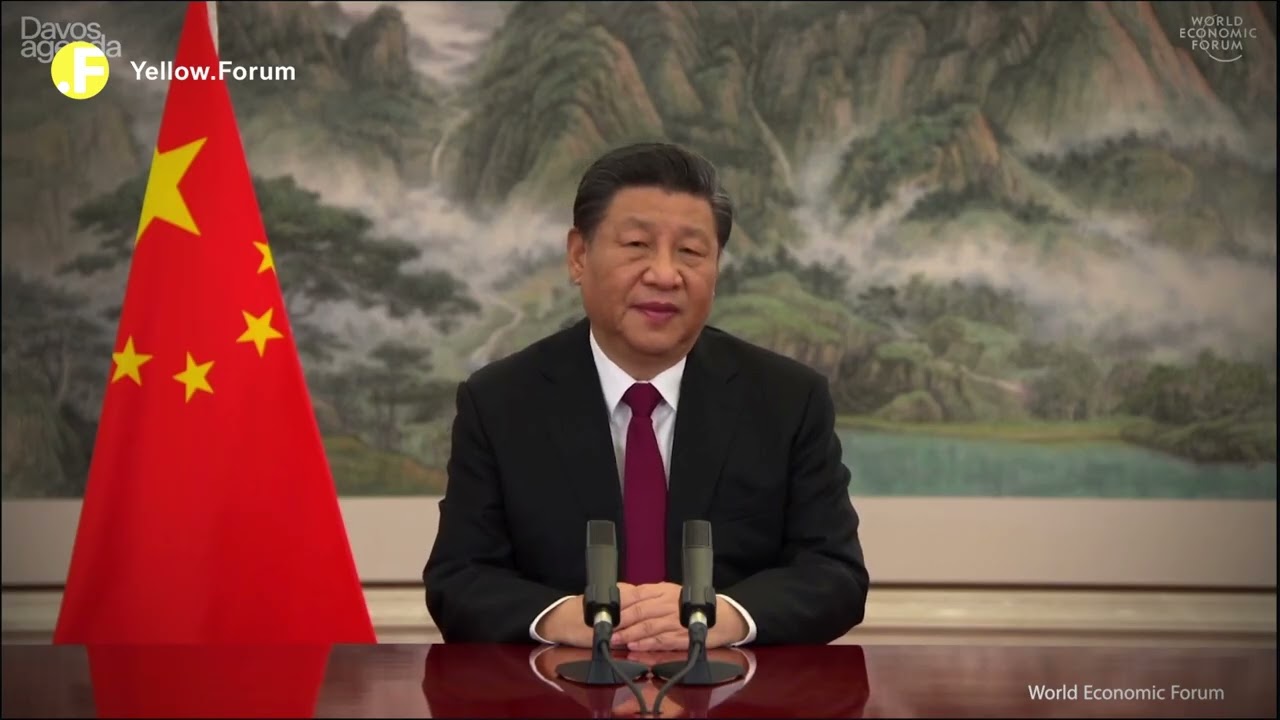Article by Richard Jeffs – work in progress.
Our governments have enacted a new political system, and most of us are blissfully unaware. It’s called Stakeholder Capitalism, and I’ve just spent sixteen months producing an independent series of feature films that investigative it.
Stakeholder Capitalism is the birthchild of the World Economic Forum’s executive chairman, Klaus Schwab. Founded in 1971, Schwab launched the World Economic Forum (WEF) to globally enact “the Stakeholder concept” (Stakeholder Capitalism). He explains: "From the beginning on, it was very much devoted to social and environmental issues”, which are Stakeholder Capitalism’s two distinguishable policies.
Below: Klaus Schwab explaining why he founded WEF.
Over the past fifty years, this influential German academic, who was mentored by the authoritarian politician Henry Kissinger and whose family made their money as a contractor for the Nazi regime, has been unsuccessful in transitioning the world to Stakeholder Capitalism; however, his fortune changed in 2020 after growing the WEF to become one of the world’s most powerful organisations.
Today, Schwab’s exclusive members include the heads of all G20 governments (from the U.S. and U.K. to Russia and China), multinational NGOs (such as the W.H.O and U.N.) and royal families, as well as executives at most fortune 500 corporations. Schwab boasts to have achieved this by enrolling them within his Young Global Leaders programme.
Schwab’s Young Global Leaders
Founded in 1992 as Global Leaders of Tomorrow, the programme was renamed Young Global Leaders (YGLs) in 2003 with a mission to shape a more inclusive and sustainable future. Also referred to as ‘Social and Environmental’ and ‘People and Planet’, Inclusive and Sustainable are the two primary policies which differentiates Stakeholder Capitalism from existing political systems (more on this later).
Upon teaching the Inclusive and Sustainable ideas to his YGLs, Schwab places them into positions of power by harnessing his influential network. He writes: 'We integrate YGLs into processes that allow them to have a real impact on global affairs.’
In a 2017 Harvard Kennedy School interview, Schwab explains: “Yesterday I was at reception for Prime Minister Trudeau, and I would know that half of his cabinet or even more are actually Young Global Leaders of The World Economic Forum. And it’s true in France now with the President”.
In addition to Canadian and French governments, Schwab proclaims to influence German and Russian governments: “When I mention names like Ms Merkel, Vladimir Putin and so on, they have all be Young Global Leaders of the World Economic Forum”.
Schwab proceeds to gloat how he achieved this: “What we are very proud of now is the young generation like Prime Minister Trudeau, the President of Argentina and so on is that we penetrate the cabinets”.
In 2020, Schwab was interviewed on The David Rubenstein Show, where he was asked: “Recent years, you’ve had Vladimir Putin, you’ve had Xi Jinping, leaders from all over the world… To get these leaders, do you have to call them and say you’re personally invited”?
Schwab responded: “No, usually their presence is the result of longer friendships.”
For over thirty years, Schwab has indoctrinated the upper echelons of politics and business with his Stakeholder Capitalism ideas. He writes: 'They are CEO’s of Fortune 500 corporations, in royal houses, in leading NGO’s and national non-profits, public figures in civil society, sports personalities, and more.’
Below: Watch the ‘Young Global Leaders’ chapter from my feature film, Stakeholder Communism.
Upon acquiring unprecedented global influence, Schwab successfully enacted our global ten-year transition to Stakeholder Capitalism in 2020.
Below: Compilation from 2020 of Schwab announcing Stakeholder Capitalism has been enacted.
Before exploring what Stakeholder Capitalism is, let’s take a moment to reflect on some significant historical events when powerful men transitioned nations away from free-market capitalism.
Aimed to purge remnants of Capitalism from China’s society, The Cultural Revolution (1966 - 1976) is the name of China’s decade-long shift to full Communism. Millions of Chinese were persecuted, including senior officials, intellectuals, scientists, landlords, rich farmers and anyone considered to be a capitalist, under Mao Zedong’s rule.
When a nation shifts away from free-market Capitalism, there’s only one direction to go: Increased authority! Today, China is considered the authoritarian world champion, a sobering reality that should be considered before supporting such a monumental transition throughout the West.
What is Stakeholder Capitalism?
Most people working in the corporate sector will have heard of Stakeholder Capitalism – or at least its corporate credit score, E.S.G. (Environmental Social Governance). To my astonishment, a considerable number of corporate professionals are supporting our transition to this political system, without fully understanding what it is.
The first red flag to be aware of is the shift is undemocratic. G20 countries have enacted the transition, but not one of our governments have informed us – not least provided the option to vote. Our shift to this new political system is happening deceptively, while being forced like a coup d’état.
Rather, however, than overthrowing governments, Schwab has penetrated the cabinets and indoctrinated successful executives. As his ideas permeate the minds of politicians and professionals throughout their sectors, the Stakeholder movement exponentially grows.
In his book and blog about Stakeholder Capitalism, Klaus Schwab references two existing political systems in use around the world: Shareholder Capitalism and State Capitalism.
-
Shareholder Capitalism: In the West, Shareholder Capitalism provides us the freedom to trade with the interest of generating profit for our Shareholders.
-
State Capitalism: In the East (such as China), State Capitalism restricts companies trade by forcing them to put their government’s interests first.
In a 2019 interview with India Today, Schwab explained which existing system he prefers: “On the one hand we have State Capitalism. On the other hand we have Shareholder Capitalism, so it’s a clash between two systems. I believe, in the short term, State Capitalism provides certain advantages”.
Below: Klaus Schwab explains which existing system he prefers.
In his book ‘Stakeholder Capitalism’, Klaus Schwab explains: ‘Concretely, from a system of “Shareholder Capitalism,” which prevailed in the West in the past 50 years, and a system of “State Capitalism”, that gained prominence in Asia, and is centered on the primacy of the state, we should move to a system of Stakeholder Capitalism.’
If Shareholder Capitalism provides ‘Shareholders’ with the authority and State Capitalism provides authority to the ‘State’ (government), Stakeholder Capitalism, obviously, provides authority to a group of Stakeholders.
The world’s most powerful elites are discretely and undemocratically transitioning us to an authoritarian political system. This is unprecedented in the history of the modern Western world. Due its global nature, it is the largest ever coup d’état.
As this authoritarian system forces us to run our businesses in the interests of a group of ‘Stakeholders’, the obvious question is: Who are the Stakeholders?
In his 2021 blog describing the dissadvantages of Shareholder and State capitalism, Schwab writes: ‘Given the shortcomings of both of these systems, we believe we need a new, better global system: stakeholder capitalism. In this system, the interests of all stakeholders in the economy and society are taken on board’.
In the paragraph above, we begin to see some of the propaganda that’s being used to indoctrinate us into wanting Stakeholder Capitalism.
The People and Planet Delusion
In his blog ‘What is Stakeholder Capitalism?’, Schwab explains the primary Stakeholders are ‘People and Planet’ – which is also Stakeholder Capitalism’s slogan.
Below: ‘People and Planet’ promoted on the cover of Schwab’s book: Stakeholder Capitalism.
Below: ‘People and Planet’ propagated by the heads of all G20 countries during their Italy 2021 family photo.
A political system that acts in the interest of all people and the planet sounds noble, which is why corporate professionals around the world are naively joining the Stakeholder Capitalism movement. Before investigating Stakeholder Capitalism further, there is something we should understand:
Authoritarian governments never promote their political systems as being authoritarian. They are propagated as being fairer, safer and more prosperous; this is how a relatively small number of tyrants manipulate millions of citizens into believing a new system is better.
Schwab’s Stakeholder Capitalism propaganda has been designed to affect us in the same way. He has convinced many of us that we are all Stakeholders and Stakeholder Capitalism benefits everyone. Insidiously, this is contrary to the truth.
In a democracy, a system that acts in the interest of People and Planet would imply that we all vote for its policies; however, none of us voted for Stakeholder Capitalism, least of all its social and environmental policies. Who, therefore, are making the decisions on our behalf?
In his blog ‘What is Stakeholder Capitalism?’, Klaus Schwab writes:
‘To ensure that both people and the planet prosper, four key stakeholders play a crucial role. They are: governments (of countries, states, and local communities); civil society (from unions to NGOs, from schools and universities to action groups); companies (constituting the private sector, whether freelancers or large multinational companies); and the international community (consisting of international organizations such as the UN as well as regional organizations such as the European Union or ASEAN).’
His ‘Key Stakeholders’ are the heads of governments, education institutions, companies and NGOs such as the U.N. and the E.U. Conveniently, these ‘Stakeholders’ are Schwab’s Young Global Leaders Alumni and exclusive World Economic Forum members.
Below: Klaus Schwab describes who his Stakeholders are.
Under the guise of acting in the interest of all People and the Planet, Schwab and his Stakeholders have enacted a global transition to a political system that provides them unprecedented authority.
Immediately below the paragraph describing his ‘Key Stakeholders’, Schwab writes: ‘All these stakeholders crucially consist of people and make use of the planet. It is no surprise then, that they should want to optimize the well-being of all of us as well as that of the environment.’
Schwab alleges his billionaire Stakeholders represent the interests of all of us simply by being people and making use of the planet. Conveniently, Schwab failed to disclose this caveat in his book, Stakeholder Capitalism.
Stakeholder Capitalism Establishes the WEF as our Global Government
Stakeholder Capitalism is a global political system that empowers the World Economic Forum as a single political authority with jurisdiction over all of Earth and humanity. The WEF Stakeholders have essentially elected themselves as a global authoritarian government.
Given his interest in authoritarianism, it comes as no surprise to hear Schwab, in his November 2022 interview with Chinese State media, proclaim: “I respect China’s achievements”, “I think it’s a role model for many countries” and “The Chinese model is certainly very attractive for quite a number of countries”.
Below: Watch Schwab’s October 2022 interview with Chinese State media.
One prominent WEF Stakeholder, who acquires a terrifying amount of power, is the President of the People’s Republic of China, Xi Jinping.
Below: Schwab welcomes Xi Jinping as a Stakeholder to govern us.
Schwab inviting Xi Jinping to “join hands” and “come together to work jointly for the world to become more Inclusive, more Sustainable” (in the video above) illustrates the terrifying amount of influence China now has in Western politics.
In my next article, I investigate Schwab’s Inclusive and Sustainable policies and the role they play for shifting us to his authoritarian political system.
Below: Watch ‘Stakeholder Capitalism – Ep 1: Our New Political System’ below:
